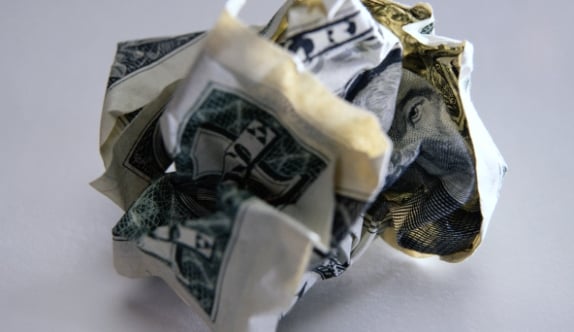Dollar-a-share peg little more than a marketing gimmick that confuses investors; this is not a bank account
Object loudly, lobby Congress and predict horrible consequences for the economy and investors. Money-market funds, like their Wall Street banking kin, are learning how to fend off new regulations meant to prevent a replay of the financial crisis of 2008. One fund company, Federated Investors Inc., is even threatening to sue.
The ploys seem to be working, and might even derail proposals to make the $2.6 trillion industry safer. That would be a shame because the Securities and Exchange Commission, which regulates the funds, is only halfway through a job it started more than two years ago. The agency should finish its work by adopting additional measures to prevent the sort of panicked run on the funds that helped kick the credit crunch into high gear.
Here's where we stand: In 2010, the SEC ordered money- market funds to hold more cash, have investments that mature more quickly and diversify their portfolios.
To the lobbyists and some of the biggest fund companies, this stopgap was enough. They say they have all the evidence they need: Money-market funds withstood the turmoil of Europe's sovereign-debt crisis, last summer's congressional debt-ceiling stalemate and the loss of the U.S.'s prized AAA credit rating. True, money funds weathered these threats. But let's be honest: At no time were markets on the verge of matching the 2008 global financial meltdown, when disaster was averted only through intense government and central bank intervention.
Market Freeze
The Reserve Primary Fund, one of the oldest money-market funds, was at the heart of the crisis. It held $785 million in commercial paper, essentially short-term IOUs, from Lehman Brothers Holdings Inc. Once Lehman went bust, Reserve investors rushed to withdraw their money. It soon became clear the fund couldn't pay back everyone's money and maintain the traditional $1 share price. In Wall Street lingo, it broke the buck.
What followed was a freeze in the commercial-paper market. Many companies rely on this short-term funding method to finance, for example, inventories and payrolls. Only when the Federal Reserve and the U.S. Treasury said they would stand behind the money funds was an industry collapse prevented. The 2010 Dodd-Frank Act has since barred another rescue of the funds, so it's up to the SEC to devise a fix.
The artificially pegged share price is the industry's greatest vulnerability. The illusory $1 a share holds out the promise that investors will receive a dollar for each dollar they put in (plus interest) -- just like a bank. But at the first sign that a fund's underlying assets no longer justify $1 a share, investors have an incentive to bolt. Naturally, money- market funds love that investors perceive them as stable as banks, which must pay into the federal deposit insurance fund for their guarantees, and say they will wither away without that perception.
Mary Schapiro, the SEC's chairman, was on the right track in February when she offered several proposals, the best of which would require a floating share price. She also raised the idea of requiring money-market funds to hold capital as a buffer against losses, as banks must do, and imposing redemption freezes when investors panic.
The floating share price is preferable because it does the most to end the illusion that money-market funds match banks for safety. It would also serve as a reminder that funds are an investment, not a demand deposit, and lack federally guaranteed insurance.
This is a less radical idea than it might seem. Funds already provide a “shadow” share price in SEC filings that reflects the underlying value of their investments.
Tax Rules
A floating share price might require some minor adjustments to tax laws. Fund investors could be subject to capital-gains taxes if they took money out and the share price was higher than $1. For individual investors who don't move their cash around a lot this wouldn't be a big issue. But for many companies, which move cash in and out of money-market funds on a daily basis, it could result in extra expenses and paperwork hassles.
To prevent companies from avoiding money funds in order to sidestep those burdens, Congress should consider exempting money-fund investors from these tax rules.
It's also worth considering a two-tier system, in which some funds would stick with a fixed share price. Those funds would only be able to invest in short-term Treasury securities and agency bonds that are safe but offer very low yields. These funds should also be backed by an explicit promise from the sponsoring fund management company that investors will be able to redeem their shares at full value. Stand-alone money funds would have to offer a floating share price.
Any significant rule changes would require an SEC vote. Because of intense industry lobbying, there's a chance nothing will happen. Luis Aguilar, a Democratic commissioner, has said he's worried that additional rules will drive investors to unregulated investments. If Aguilar voted no, Schapiro, an independent, and the other Democratic member, Elisse Walter, wouldn't have a majority. The two Republicans on the five-member commission oppose more regulation.
Rather than threatening lawsuits, the industry would be better served by cooperating with the SEC to draft rules to ensure that money-market funds are less susceptible to runs while still appealing to investors. At least one major investment company, BlackRock Inc. (BLK), the world's biggest asset manager, has dropped its earlier opposition and now backs floating share prices. That's a sensible stand and one the rest of the industry should adopt.
--Bloomberg News--
(The opinions expressed here are solely those of the editors of Bloomberg News).







